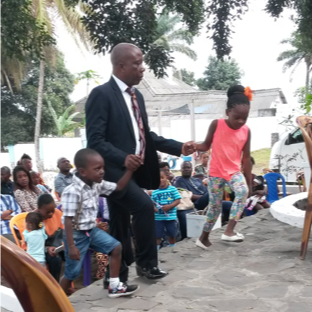Transformational Principle 1
Last week I travelled for a few days. While I was gone, Dana transformed an old thrift-store desk into a beautifully restored antique. She worked hard to take it apart, scrub, sand, and paint it. Knowing that I love to put things together, she waited to finish it. When I got home, I spread out the doors, handles, nuts, and nails. I didn’t know how the pieces went back together: I had a basic idea, but there were brackets and strips of wood that I didn’t understand. What was the desk supposed to look like when it was together?

I needed help, I needed to know the design.
When your children sit down in your classroom, what are you after? When they come to you, what is your purpose? We know that we teach best when we have the end in mind.
The first of four TeachBeyond principles for Transformational Education helps us know where to go and how to get there: “We pursue transformation which aligns with God’s creative design while trusting the Spirit for complete transformation into the image of Christ.”
What does this mean for you today?
- We have a powerful purpose. We don’t just go through the curriculum. Our overarching purpose for each child is uncovering “God’s creative design.” We call out in each student a design rooted in the image of God (Genesis 1:27) and by God’s grace we encourage every student to become like Christ and develop the gifts and abilities God has given to accomplish His purposes (Ephesians 2:10).
- We pray for wisdom. As I needed Dana to show me how the pieces fit for the desk, we need God’s wisdom to help us understand how each child is designed, what each one can be as a unique and special person (Jeremiah 1:5). We ask the Lord to show us what each child might be, not just how they are.
- We pray for God to work. God, not the teacher, grows children (1 Corinthians 3:6). Just as Paul planted and Apollos watered, we contribute in some way to our students’ growth, but we cannot transform a child. This is God’s job. We can use best practices and pray for His grace, but the Holy Spirit transforms hearts and lives. We don’t. A wise transformational teacher once said, “We do much less than we think we do.”
- We respect each person. Since we are pursuing God’s creative design, we watch each child for hidden gifts and strengths. Then we give them opportunities to use and grow according to their gifts. We provide options for learning when we can so that each child grows toward the design God has for them. We celebrate each one’s giftedness and place in our class.
- We recognise two levels of transformation. The first is growing each child toward the best he or she can be through normal teaching practice. We give them education that changes their knowledge and abilities, helping each child to become the special person each is. But we are always mindful of pointing them to complete transformation in Jesus by knowing Him through faith and becoming a new creation (2 Corinthians 5:17).
- There is no end. Every child can continue to grow and learn, even if he or she has met the curriculum standards. Every child who knows Jesus by faith should continue to learn and grow toward the image of Christ. Faith in Christ is not our end goal, complete transformation to His image is—and this is a life-long process.
- We are not adequate to do this. As Paul says in 2 Corinthians 3:5, “Not that we are adequate in ourselves to consider anything as coming from ourselves, but our adequacy is from God.” We are servants of a new covenant, of the Spirit who gives life. The beginning of our work as a transformational educator is to be transformed ourselves by knowing we are also in need of the work of the Spirit in our lives. Perhaps the most important thing we can do for our students is to make sure we are letting God transform us.
As I studied the pieces of the desk and Dana told me how they fit, we were able to put together a beautiful, new desk out of an old one. In so much higher and deeper and wider ways, God will use you to pursue His design for each child, by His grace through the Holy Spirit. Each child can become more what God intends and we get to be a part of that.
Joe Neff, Th.M.
Coordinating Director of Education Services
TeachBeyond Global
Photo Credits: Desk. J. Neff, 2019. Girl. T. Peters, 2017. ble 2 Ac





